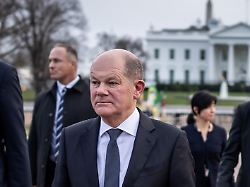Two years of war in Ukraine
Germany must fear the real turning point
A commentary by Philipp Sandmann, Washington
February 25, 2024, 8:22 a.m
Listen to article
This audio version was artificially generated. More info | Send feedback
Germany hopes and hopes and hopes. Here’s to US presidents protecting Europe. So far this strategy has worked. But two years after the start of the Russian war of aggression on Ukraine, we finally have to understand: This is no longer enough.
The shock waves following Donald Trump’s comments about NATO reached Berlin faster than Washington. A former – and possibly future – US president who openly bashed American allies and “encouraged” Russia to take action against NATO states that do not pay enough for their own defense was something new level.
But actually nothing new, this Trump madness. The truth is: Russia first had to attack Ukraine for Germany to wake up from its deep sleep two years ago and finally break with its ignorant attitude towards its own Bundeswehr. The turnaround Chancellor Olaf Scholz, as finance minister in the last Merkel coalition, was one of the biggest opponents of the two percent target. Back in 2019, Scholz even had a wording (very cautious by today’s standards) deleted from the grand coalition’s mid-term balance sheet, which stated that Germany felt obliged to increase defense spending to two percent of GDP.
This very same Chancellor sat in the White House in Washington DC a few weeks ago and had to admit: “Without the support of the USA, it will be impossible for Ukraine to defend its country.”
German wishful thinking
The mistakes of the past hold a key to understanding today’s situation. The SPD, but also many politicians from other parties, misjudged the situation for years. Former Federal President Joachim Gauck said a year ago with regard to the relationship with Russia: “There is wishful thinking in Germany that goes far beyond social democracy: If we just look at the opponent in a friendly manner, then he will react “Appropriately. People didn’t recognize the other person’s difference. They didn’t want to perceive hostility where hostility already existed.”
And German federal governments ignored the obvious warning signs: whether Putin’s annexation of Crimea in 2014 or Trump’s election victory in 2016 and the then temporary end of harmonious transatlantic relations. The fact that Donald Trump classifies NATO as “obsolete” has been clear since 2017 at the latest. But what did people do to prepare for the future? People were hoping for Joe Biden. For four years.
Now people are hoping again… for Joe Biden. But this time the world is different and the Republican Party in the US is increasingly becoming a soulless collection of Trump fanatics.
Europe’s security is no longer guaranteed
Germany is now reaching the two percent target, albeit with a few tricks. But the SPD politician Michael Roth, chairman of the Foreign Affairs Committee of the German Bundestag, says: “A second term in office for Donald Trump would be tantamount to another turning point, because Europe’s security was no longer guaranteed from the first day of his term in office ¤re. Putin will see this as an invitation to test the limits of our partners on NATO’s eastern flank.” Europe’s security would no longer be guaranteed if the Americans chose a different US president? It would be a turning point that Germany would have to fear. Roth’s assessment may be correct, but it’s also damn sad.
Because the problem is: Germany continues to only jump as high as it has to. We must now have the courage to think about our defense and the defense of Europe in a completely new way. But this would also require the SPD to clearly commit to this defense – as an entire party.
In any case, we cannot continue to only hope for Biden. We finally have to jump higher. We owe this to Ukraine, but above all to ourselves. And ultimately we owe it to the Americans, who have taken care of protecting the Federal Republic for decades. Former US Secretary of State Dean Acheson wrote in a 1963 essay for Foreign Affairs that NATO had no real plan for the defense of Europe. 60 years later you ask yourself: Do we actually have this plan today?
